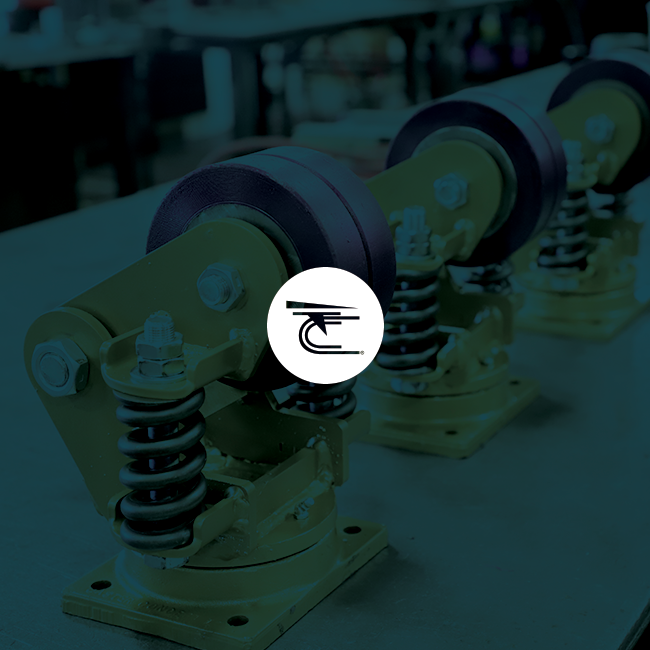

Polyurethane caster wheels appeared back in the ’70s, and have had an impact on many industries and product lines.
Polyurethane on Cast Iron is the most common wheel type used in industrial caster applications. These wheels consist of a polyurethane tread that’s bonded to a cast-iron wheel core. These types of wheels are extremely durable and rugged and capable of carrying heavy loads. There are different formulations that can be used when making a heavy duty polyurethane caster wheel depending on the application. You can find the different types and benefits here.
At our main facility, Caster Concepts has developed custom polyurethane formulations to conquer the most common challenges in manufacturing and industrial environments. We process polyurethane in our facility and are one of the very few caster manufacturers that do so. This allows us to maximize quality and flexibility, ensuring you get the best tread formulation for your specific challenge.
Besides offering a greater load capacity, heavy duty polyurethane caster wheels have other benefits that make them a go-to choice, including noise reduction, floor protection, less friction, and resistance to corrosion.
Noise is right at the top of the list for OSHA concerns. This challenge makes heavy duty polyurethane caster wheels a popular choice because of their quietness in operation when compared to harder wheels such as steel or cast iron. The polyurethane acts as a shock absorber and helps cushion the ride. It also absorbs bumps from uneven terrain. This noise reduction can significantly reduce noise levels to help protect your employees’ hearing.
Casters made with Polyurethane can provide a greater load-bearing capacity while still providing the benefits of a rubber tread, such as noise reduction, shock absorption, and floor protection.
Speaking of floor protection, polyurethane wheels rule. Polyurethane deflects and creates a much larger footprint than harder wheel materials, such as nylon. This larger surface area helps reduce the stress concentration on floors and keeps them in better shape for longer periods.
There are many different types of polyurethanes formulations. Each has varying levels of resistance to specific environments or conditions such as chemicals, solvents, or even water. In humid or wet environments, certain polyurethanes will not break down or corrode in the presence of water. Certain polyurethane formulations can also prolong a wheel’s life in situations where chemical exposure is a problem.
Even with polyurethane’s many benefits, there are still certain conditions and situations where you could experience a polyurethane wheel failure. For example, heat is polyurethane’s number one enemy. Most common urethanes will not withstand ambient heat above 230 degrees for any longer than 60-90 minutes without experiencing damage. In these cases, high-performance polyurethanes are used. A cost-effective solution for this type of application is Caster Concept’s TODI polyurethane.
Quality in manufacturing is another important consideration when choosing a poly caster wheel. That’s because hidden manufacturing defects are the most common method of failure. These failures happen where the urethane and the core (steel or cast iron) are bonded. To minimize these failures, preparation is the key. Proper steps include preparing and proper preheating of the core, cleaning the surface, and applying the bonding agent correctly. Following these steps can reduce the probability of premature failure significantly. It’s also important to choose a manufacturer like Caster Concepts that follows a quality procedure and is ISO 9001-2015 certified.
When determining the polyurethane needed for a wheel or roller application, the load-bearing capability is the main consideration. Polyurethanes come in different levels of hardness, which is measured in durometers. The higher the number on the durometer scale, the greater the wheel’s resistance to indentation. Standard durometers range from 70 shore A, which is slightly harder than typical rubber materials, to 70 shore D, which is as hard as a bowling ball and designed to maximize weight capacity. It is also non-marking and wear resistant.
| T/R 85 Tread Polyurethane This material produces a 85A durometer wheel that resists the accumulation of metal chips, sheet metal screws, and foreign objects often found in manufacturing facilities. The high rebound of this material provides increased rollability in ergonomic in-plant applications and has become a favorite in production line delivery systems across the country. |
Retreading Polyurethane Caster Wheels is becoming a popular way to reduce costs and replace worn-out polyurethane wheels. It also has some environmental benefits as well. If the metal wheel cores are still in good shape, replacing worn polyurethane along with new bearings can be less expensive than buying new industrial polyurethane wheels.
At Caster Concepts, Inc. we can retread your urethane wheels to help you save money, reduce energy waste, and reduce lead times for specialized wheels. If you have any questions regarding the use of heavy duty polyurethane caster wheels, talk to our engineering staff or sales staff, we are happy to help.